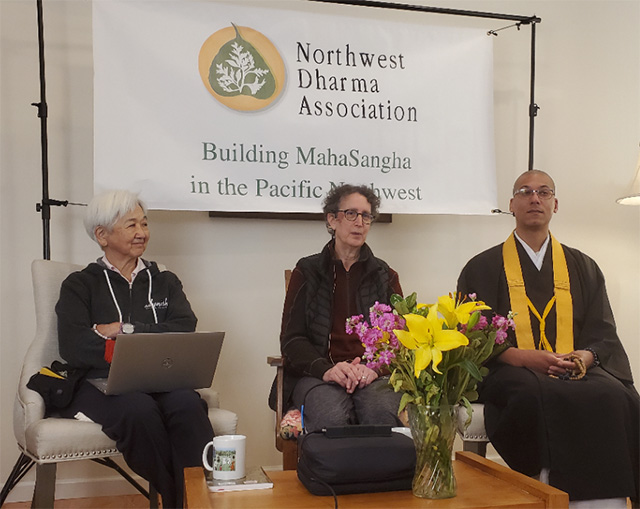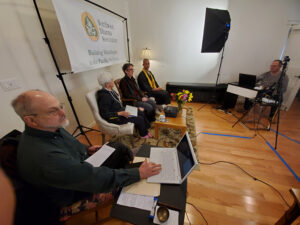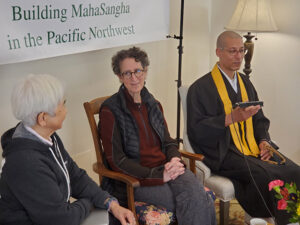Dharma Teachers From Multiple Traditions Meet
Written by: Steve Wilhelm

Teachers Zen Master Jeong Ji, also known as Anita Feng; Rev. Kosho Finch, and Irene Goto traded views during the afternoon panel discussion.
Photos by: Steve Wilhelm
Buddhist teachers from around the Northwest gathered on Saturday, April 9, for the first Northwest Dharma Association Meeting teachers’ meeting since the beginning of the pandemic.
The discussion was lively and heartfelt, conducted simultaneously online and in person. The day was divided into two sections, with a morning meeting among 20 teachers, who were free to exchange ideas without being recorded. This was followed by a public panel discussion among three teachers, which was joined by about 16 people online.

Behind the scenes, Northwest Dharma Association leaders George Draffan (left), and Tim Tapping, kept the Zoom wheels rolling.
During the first section, some of the questions discussed were challenges of maintaining community during the pandemic, incorporating traumas into practice, relating to the needs of young people.
The two-hour discussion, which included a breakout group, was very engaged, with teachers giving rapt attention.
The afternoon panel featured three speakers:
- Zen Master Jeong Ji, also known as Anita Feng, lead teacher of Blue Heron Zen Community of Washington in Seattle.
- Rev. Kosho Finch, head minister of the Henjyoji Shingon Buddhist Temple in Portland.
- Irene Goto, assistant minister at Seattle Betsuin Buddhist Temple in Seattle.
All three welcomed the warm vigor of the exchanges, and the way the different teachers appreciated each other and each other’s traditions.
“The flavor from this salad bar is one of respect, of our rich traditions, but also of who we are now,” Feng said. “This is a very fine edge in terms of how we make this practice alive, vital, and our own.”
She noted the balancing of genders in her sangha, from about 80 percent male some years ago, to now half women since she became guiding teacher.
Speaking of her growing understanding of role as teacher, she said, “It’s our job to go from a deeper place, and trust there is commonality of integrity and practice.”

One of many moments of warmth among the three teachers.
As a ”Gen X” person and the youngest teacher on the panel, Finch said he’s very aware of balancing the needs of his tradition’s older members, with the needs of younger people.
“Younger people are getting interested as well,” he said. “If we have youth groups, bringing young people in, they will help in guiding us.”
Goto, who created an organization of younger Buddhists called Young Buddhist Editorial, said the next generation in the dharma is of primary importance.
“We need to trust the youth, have them go with their own ideas…We need to trust our youth,” she said. “We may be losing members, but we’re also gaining insights with new people.”
A wide range of questions and points from the online audience were raised during the discussion period.
In response to a question about whether translations into English could have the inner power of originals, Feng suggested people look back further into history.
“From Zen perspective, it’s all a translation. Whatever the original sutta was, that’s also a translation,” she said. “We could have direct experience in any language.”
In response to a question about bringing new people into Buddhist tradition, Go spoke about the critical importance of human warmth and connection.
“The simple thing is to make everyone feel welcome,” she said, referring to her first visit to Seattle Betsuin. “There was a person there who made me feel welcome. If he hadn’t been there, I wouldn’t have come back.”
She added, “It’s as simple as going up to someone and saying, ‘Hi, I haven’t met you before.’”
Finch, who is Black, said his response to people’s reactions to him has been part of his teachings.
“I’ve been called racial slurs. They don’t expect the brown guy with the bald head to dress that way,” he said. “Ahimsha means the absence of violence. How do we practice emptying ourselves of violent intentions? I think the dharma is good at that.”
Steve Wilhelm is editor of Northwest Dharma News. He has practiced in several Buddhist traditions since 1987. He currently leads Eastside Insight Meditation, and is a Local Dharma Leader for Seattle Insight Meditation Society. A former journalist, Wilhelm has edited four dharma books and is currently editing a fifth. He lives in Kirkland, Washington, with his wife Ellen.
